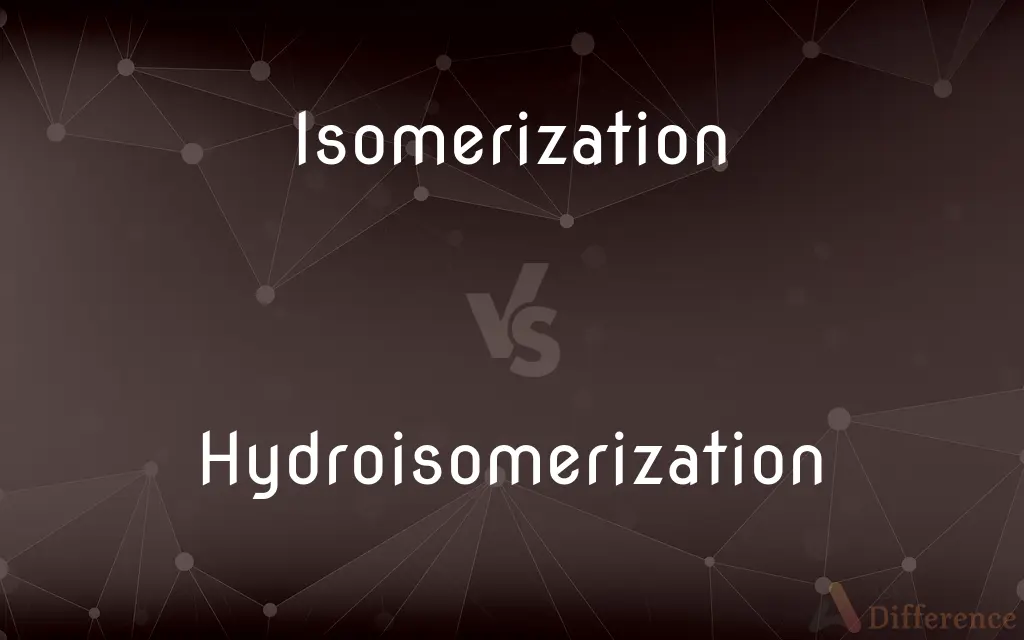Isomerization vs. Hydroisomerization — What's the Difference?
By Tayyaba Rehman — Published on November 5, 2023
Isomerization is the process of converting a molecule to its isomer, while Hydroisomerization involves the presence of hydrogen during the isomerization process.

Difference Between Isomerization and Hydroisomerization
Table of Contents
ADVERTISEMENT
Key Differences
Isomerization is a chemical reaction that results in the rearrangement of the molecular structure of a compound without altering its net atomic composition. Hydroisomerization, on the other hand, includes the presence of hydrogen, either as a reactant or a catalyst, facilitating the transformation of one isomer into another.
In the context of isomerization, molecules shift their internal structures to produce isomers, which have the same molecular formula but different structural arrangements. In contrast, hydroisomerization introduces the additional element of hydrogen, which can affect not only the structural arrangement but also the hydrogen content of the final isomer.
Isomerization processes are widely applied in petrochemical industries, especially when aiming to alter the physical properties of hydrocarbons. Hydroisomerization, with the influence of hydrogen, can yield specific desired products or optimize certain reactions in the hydrocarbon processing realm.
Although both processes aim at producing isomers, the methodology, mechanism, and sometimes the desired outcomes differ significantly between isomerization and hydroisomerization.
Comparison Chart
Definition
Rearrangement of molecular structure
Isomerization in the presence of hydrogen
ADVERTISEMENT
Atomic composition
Unchanged
Can introduce additional hydrogen
Catalyst
Various, depending on the reaction
Typically requires a hydrogenating catalyst
Application
Broad in chemical industry
Specific to petrochemical refining
Hydrogen involvement
Absent
Integral to the process
Compare with Definitions
Isomerization
A process of converting a compound into its isomer.
Through isomerization, the molecule achieved a different structural arrangement.
Hydroisomerization
Predominantly used in refining and petrochemical industries.
To upgrade the quality of gasoline, hydroisomerization is often employed.
Isomerization
Involves molecular rearrangement without changing atomic composition.
The hydrocarbon underwent isomerization, resulting in a branched form.
Hydroisomerization
Typically requires a hydrogenating catalyst.
The hydroisomerization process was facilitated using a platinum-based catalyst.
Isomerization
Common in petrochemical industries to change hydrocarbon properties.
Isomerization helps in converting straight-chain hydrocarbons to branched ones.
Hydroisomerization
Isomerization process that involves hydrogen.
Hydroisomerization uses hydrogen to convert linear hydrocarbons to branched ones.
Isomerization
Leads to the formation of structural or geometric isomers.
Through isomerization, cis and trans isomers of the compound were formed.
Hydroisomerization
Can introduce additional hydrogen atoms into the molecule.
Apart from rearrangement, hydroisomerization added hydrogen to the compound.
Isomerization
Does not involve the addition or use of hydrogen.
The primary difference is that isomerization doesn't require hydrogen.
Hydroisomerization
Aims at product optimization and specific desired outputs in refining.
Hydroisomerization was chosen to optimize the fuel's octane number.
Isomerization
To cause to change into an isomeric form.
Hydroisomerization
(organic chemistry) The isomerization of alkane hydrocarbons via an intermediate alkene; used especially in oil refining
Isomerization
To become changed into an isomeric form.
Isomerization
(chemistry) the conversion of a compound into a different isomeric form
Isomerization
The conversion of a compound into an isomer of itself
Common Curiosities
Can Isomerization change the molecular formula of a compound?
No, isomerization changes the structure but retains the same molecular formula.
What does Isomerization refer to?
Isomerization is the rearrangement of a molecule into its isomer without changing its atomic composition.
Is Isomerization exclusive to the petrochemical industry?
No, while common in petrochemicals, isomerization occurs in various chemical contexts.
How does Hydroisomerization differ from Isomerization?
Hydroisomerization involves the presence of hydrogen during the isomerization process.
What role does hydrogen play in Hydroisomerization?
In Hydroisomerization, hydrogen can act as a reactant, or it can facilitate the reaction using a catalyst.
Are there any specific catalysts used in Hydroisomerization?
Yes, typically a hydrogenating catalyst, like platinum, is used in Hydroisomerization.
Is Hydroisomerization more efficient than Isomerization?
It depends on the desired outcome; Hydroisomerization can be more efficient for specific refining goals.
Does Hydroisomerization always introduce additional hydrogen to the compound?
Not always, but it can introduce additional hydrogen depending on the reaction.
Which process results in a change in physical properties of hydrocarbons?
Both Isomerization and Hydroisomerization can alter hydrocarbon properties.
Can Isomerization produce both structural and geometric isomers?
Yes, Isomerization can lead to both types of isomers.
What are the primary applications of Hydroisomerization?
It's predominantly used in refining, especially to upgrade gasoline quality.
Do both processes require catalysts?
Often, both processes use catalysts, but the types of catalysts may differ.
Which process is older, Isomerization or Hydroisomerization?
Isomerization is a broader and older concept; Hydroisomerization is a subset involving hydrogen.
Can Isomerization and Hydroisomerization co-occur in a reaction?
They can co-occur if the conditions and reactants support both types of reactions.
How significant is the role of hydrogen in Hydroisomerization?
Hydrogen's role in Hydroisomerization is integral, either as a reactant or aiding with a catalyst.
Share Your Discovery

Previous Comparison
Chili Powder vs. Ancho Chili Powder
Next Comparison
Likely vs. PossibleAuthor Spotlight
Written by
Tayyaba RehmanTayyaba Rehman is a distinguished writer, currently serving as a primary contributor to askdifference.com. As a researcher in semantics and etymology, Tayyaba's passion for the complexity of languages and their distinctions has found a perfect home on the platform. Tayyaba delves into the intricacies of language, distinguishing between commonly confused words and phrases, thereby providing clarity for readers worldwide.
















































